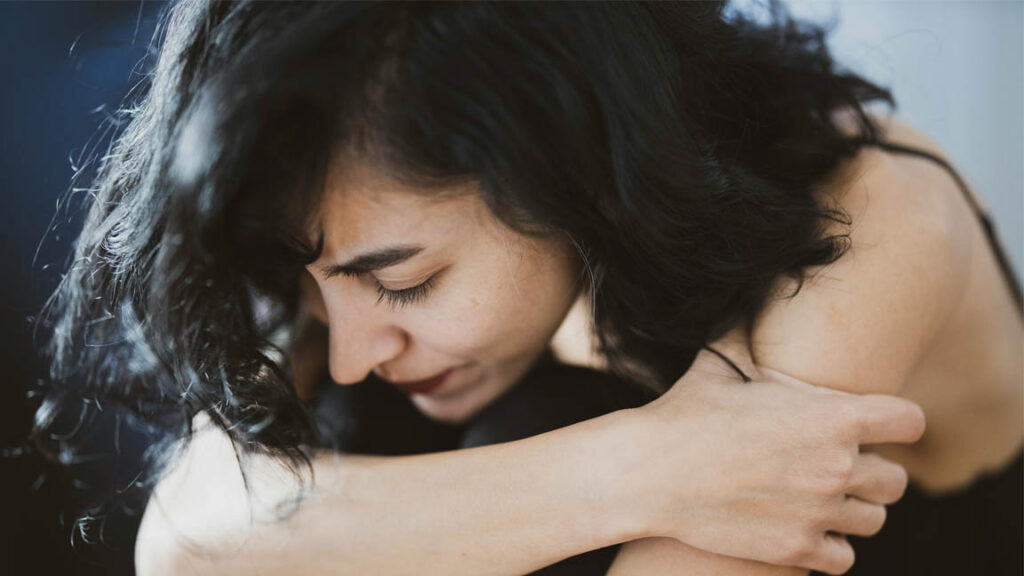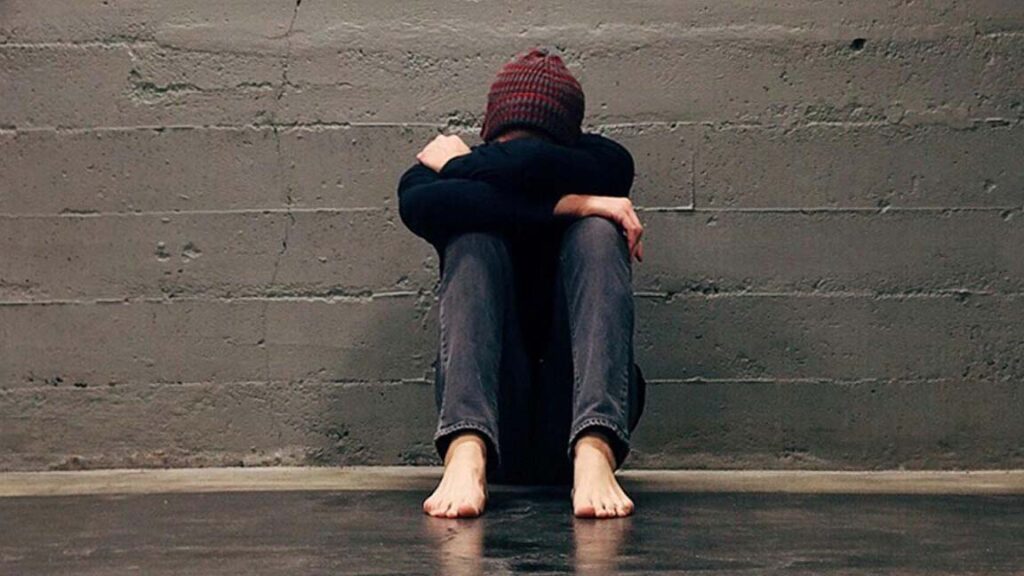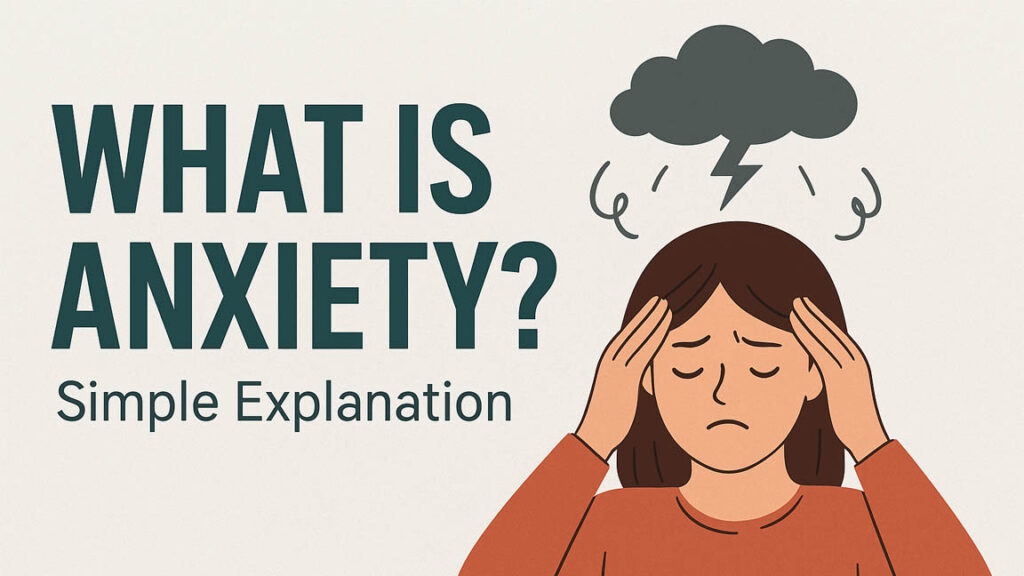Have you ever felt your heart race before a big exam or an important meeting? That jittery sensation is anxiety, and believe it or not, almost everyone experiences it at some point. It’s your body’s early-warning system, a built-in alarm designed to prepare you for challenges.
Think of it like this: 📞
- Before a school presentation, your stomach feels tight.
- While waiting for interview results, your palms get sweaty.
- Even a small thing—like sending a risky text—can make your chest pound.
That uncomfortable rush isn’t random—it’s anxiety stepping in to keep you alert.
According to the American Psychological Association, anxiety is “an emotion characterized by feelings of tension, worried thoughts, and physical changes like increased blood pressure.” In simple words, it’s your brain saying: “Be ready. Something important might happen.”
Here’s the twist: a little anxiety can actually be useful. For example, a student with mild anxiety before an exam usually studies harder and stays more alert during the test. Athletes often say that pre-game nerves push them to perform better. So anxiety isn’t always your enemy—it’s often a motivator.
But… when anxiety becomes too strong, too frequent, or shows up without real danger, that’s when it stops helping and starts hurting. That’s the line where normal anxiety turns into a disorder.
What Is Anxiety? 🧠
At its core, anxiety is not just “feeling worried.” It’s a future-oriented mood that mixes three things together:
- Worry in the mind → constant “what if” thoughts.
- Tense expectation → imagining something bad before it even happens.
- Physical unease → fast heartbeat, sweaty palms, shaky hands.
Researchers at the National Center for Biotechnology Information (NCBI) describe anxiety as a state where the brain prepares itself for potential danger—even when the threat is not real or immediate. Similarly, experts at psychiatry.org explain that anxiety is different from ordinary fear.
👉 Here’s the key difference:
- Fear happens when the danger is right in front of you (like a barking dog charging at you).
- Anxiety happens when your brain imagines the danger might come—even if it’s only in your thoughts (like worrying a dog might attack while walking past a park).
According to Wikipedia, anxiety is an anticipatory response. Your body and mind gear up as if something bad could occur, even though the present moment may be perfectly safe.
Think of anxiety as your brain’s “forecast system.” Fear is about the storm you see outside your window; anxiety is about the storm you think might come tomorrow.
Why Do We Feel Anxiety?
Have you ever noticed how a smoke detector sometimes goes off even when you’re just making toast? Annoying, right? But it’s designed that way—better to alarm you when there’s no fire than to stay silent during real danger.
Anxiety works the same way. It’s an evolutionary defense mechanism that helped our ancestors survive. Thousands of years ago, early humans who worried about rustling bushes (thinking a predator might be hiding) had a better chance of staying alive than those who ignored the sound. That built-in caution became part of our biology.
👉 Anxiety is basically the brain’s way of predicting danger before it arrives. It acts as a protective shield, keeping us alert and ready.
The problem? In today’s modern world, we don’t face saber-toothed tigers or wild predators. Instead, our brain often sets off the same “alarm” for smaller things—like:
- Waiting for exam results 📄
- Preparing for a job interview 👔
- Worrying about bills or deadlines ⏳
In these situations, there’s no physical threat, but the body still reacts as if something dangerous is about to happen. That’s why your heart races, your palms sweat, and your mind goes into overdrive—even though you’re safe.
So, we feel anxiety because our brain prefers to over-prepare rather than under-protect. It’s a survival feature that sometimes misfires in modern life.

How Anxiety Shows Up in Daily Life
Picture this: you’ve just finished a job interview. Now you’re back home, waiting for that call. Instead of relaxing, your brain won’t stop replaying tiny details:
- “Did I sound confident enough?”
- “What if I messed up that one answer?”
- “Maybe they didn’t like me at all…”
That restless loop of thoughts, your racing heartbeat, the sweaty palms — that’s anxiety stepping in. It’s your mind trying to “prepare” you for rejection, even when nothing has actually happened yet.
And it doesn’t just stop at interviews. Anxiety sneaks into so many parts of life:
- 📚 Before exams → Even if you’ve studied, your stomach twists with worry.
- 💬 Social gatherings → You overthink what you’ll say or fear being judged.
- 🛌 At night → Your body is tired, but your brain keeps running a highlight reel of every “what if.”
- 💼 Work deadlines → One email notification feels like a full-blown alarm.
👉 In simple terms: fear is about real danger happening now, but anxiety is about the “maybe danger” that might happen later.
So, anxiety shows up like that overprotective friend—always warning you, even when the risk is tiny or imaginary. Sometimes it helps, but many times, it just leaves you exhausted.
What’s Going On Inside Your Brain
When anxiety kicks in, your brain isn’t just “imagining” things — it’s running a real biological program.
The amygdala (the brain’s fear center) and the limbic system (which controls emotions) suddenly become extra active. The moment they sense a possible threat, they send out signals that trigger your body’s fight-or-flight response.
That’s why you feel things like:
- ❤️ Racing heartbeat → pumping blood faster, as if you need to run.
- 🌬️ Shortness of breath → your body thinks it needs more oxygen.
- 😓 Sweaty palms → helping you grip better in case of danger.
- ⚡ Restlessness & jitters → muscles staying alert for action.
👉 Here’s the catch: Your brain can’t always tell the difference between a real tiger chasing you… and just worrying about tomorrow’s meeting. So the same system gets triggered, even when nothing life-threatening is happening.
In other words, anxiety is like your body’s alarm system — sometimes useful, but often it keeps ringing even when there’s no real fire. 🔔

Different Faces of Anxiety
Not all anxiety looks the same. Sometimes it’s just a passing worry… but when it becomes too strong, too frequent, or starts interfering with your daily life, doctors call it an anxiety disorder.
According to experts (Mayo Clinic, NIMH, WHO), here are the most common types:
- Generalized Anxiety Disorder (GAD) → A constant cloud of worry hanging over almost everything in life — work, health, family, even small daily tasks.
- Social Anxiety Disorder → The intense fear of being judged, embarrassed, or rejected in social situations (like giving a presentation or meeting new people).
- Panic Disorder → Sudden, unexpected waves of fear — often with chest pain, dizziness, and a racing heart. Many mistake it for a heart attack.
- Specific Phobias → Strong, irrational fears of certain things like flying, spiders, or heights. Even if you know it’s not dangerous, your body reacts as if it is.
👉 The key difference between “normal worry” and a disorder is simple:
If anxiety controls your life instead of protecting it, that’s when it crosses the line.
Everyday Impact Makes a Difference
Anxiety isn’t rare at all. In fact, the World Health Organization says it affects hundreds of millions of people worldwide. That means almost everyone either goes through it themselves or knows someone who does.
The real problem starts when anxiety gets too much. If it keeps piling up, it can mess with your daily life — like struggling to focus at work, losing motivation in school, or even creating tension in relationships. Left unchecked, it quietly eats away at your quality of life.
But here’s the interesting part: anxiety isn’t always bad. A little bit of it can actually be useful. Think about those nerves you feel before a big presentation or exam — they push you to prepare better, stay alert, and perform at your best. The Washington Post even says a touch of anxiety sharpens focus and drives action.
👉 So the real key is knowing the difference: when anxiety is helping you, and when it’s starting to control you.
FAQ: What Is Anxiety & Why Do We Feel It?
1) What is anxiety?
Answer: Anxiety is your body’s early‑warning system. It shows up as worry in the mind and tension in the body when you anticipate something could go wrong. A little anxiety can sharpen focus; too much can exhaust you.
2) Is anxiety normal or a disorder?
Answer: Normal anxiety comes and goes around specific stresses (exam, interview) and eases once the event passes. Anxiety disorder is when worry is excessive, persistent, and interferes with daily life (work, study, sleep, relationships).
3) What are the common symptoms of anxiety? (mind + body)
Answer:
- Mind: racing thoughts, “what‑ifs,” difficulty concentrating, irritability.
- Body: fast heartbeat, shortness of breath, sweaty palms, shaky or tense muscles, stomach distress, sleep problems.
Tip: If symptoms are severe, frequent, or frightening, speak with a healthcare professional.
4) What’s the difference between anxiety and a panic attack?
Answer: Anxiety builds gradually and is tied to future worries. A panic attack is a sudden, intense surge of fear with strong physical symptoms (pounding heart, chest tightness, dizziness) that peak within minutes. Panic attacks can happen with—or without—a clear trigger.
5) Why do we feel anxiety at all?
Answer: It’s an evolutionary safety feature—like a smoke detector. Your brain would rather over‑warn you than risk missing real danger. Modern life can trigger the same alarm for non‑dangerous situations (emails, deadlines, social worries).
6) How can I calm anxiety fast (right now)?
Answer: Try a quick combo:
- Box breathing (4‑4‑4‑4): inhale 4, hold 4, exhale 4, hold 4 — repeat 4 cycles.
- 5‑4‑3‑2‑1 grounding: name 5 things you see, 4 you feel, 3 you hear, 2 you smell, 1 you taste.
- Cold splash or ice cube hold: helps reset your body’s alarm.
- Move your body: a brisk 5–10 minute walk to burn off adrenaline.
Save a few of these in your phone notes for quick access.
7) Does exercise really help with anxiety?
Answer: Yes. Regular aerobic movement (walking, cycling, dancing) lowers stress hormones and boosts feel‑good brain chemicals. Even short “exercise snacks” (5–10 minutes) can help on busy days.
8) Can anxiety cause chest pain or heart palpitations?
Answer: It can. The fight‑or‑flight response tightens chest muscles and speeds up heart rate, which may feel like pain or pounding. Emergency rule: New, severe, or persistent chest pain needs urgent medical evaluation to rule out heart problems.
9) What treatments work best for anxiety?
Answer:
- Cognitive behavioral therapy (CBT): strong evidence across many anxiety disorders; teaches skills to change unhelpful thought‑patterns and face fears safely.
- Medications (e.g., SSRIs): can reduce symptoms, especially when anxiety is moderate‑to‑severe; discuss benefits/side‑effects with a clinician.
- Skills & habits: breathing, grounding, sleep hygiene, exercise, reducing caffeine/alcohol.
Often, CBT + lifestyle changes are tried first; medication can be added based on severity and preference.
10) When should I see a doctor or therapist?
Answer: Seek help if anxiety is hard to control, lasts most days, impairs life, or you notice panic attacks, substance use, depression, or thoughts of self‑harm (in which case, seek emergency help immediately).
11) Can anxiety be cured permanently?
Answer: Many people recover or learn to manage anxiety so it rarely interferes with life. Think “skills and management” more than a one‑time cure: with the right tools (therapy, habits, sometimes medication), anxiety can become a background signal—not the driver.
12) What lifestyle changes actually make a difference?
Answer:
- Sleep: a consistent 7–9 hours; same sleep/wake time daily.
- Caffeine & alcohol: cut back if you notice jitteriness or next‑day anxiety.
- Food & rhythm: regular, balanced meals; don’t skip.
- Connection: talk to a friend, support group, or counselor.
- Tech boundaries: schedule worry time; avoid doom‑scrolling at night.
13) Which supplements or foods help with anxiety?
Answer: Evidence is mixed. Focus on whole foods, hydration, and steady meals first. If considering supplements, discuss with a clinician—especially if you take other medications. Habits (exercise, sleep, CBT skills) have stronger support than most supplements.
14) Is anxiety always bad?
Answer: No. In small doses, anxiety can boost focus and motivation before important tasks. The goal isn’t zero anxiety—it’s right‑sized anxiety that keeps you alert without running your life.
Final Thoughts 📝
So, what is anxiety really? It’s not just a medical term or a passing feeling—it’s a part of everyday life. For some, it’s a quiet worry that comes and goes, for others it’s a disorder that can affect work, relationships, and health if left unchecked. But remember, anxiety isn’t always the enemy. In small amounts, it can sharpen focus, push us to prepare better, and even motivate action.
The key is balance. When anxiety starts to take over daily life, that’s when it’s time to reach out for help—whether through therapy, lifestyle changes, or medical guidance. You’re not alone in this journey; millions face it every day, and with the right support, it can be managed.
If you’ve been wondering “What is Anxiety and how does it affect me?”—hopefully this guide gave you clarity. The next step is simple: stay aware, be kind to yourself, and don’t hesitate to seek support when needed.
👉 Your turn: Have you ever found that a little anxiety actually helped you perform better? Share your thoughts in the comments below!
🔥 CTA: Discover, Heal & Grow Today! 🔥
🧠 Struggling with paranoia? Find clarity here 👉 Paranoia in the Brain – Causes & Fixes
💆 Want natural relaxation & energy? 👉 Sauna Benefits – Body & Mind Healing
🌍 Join our growing community 👉 Follow E-Vichar on Facebook
✨ Your journey to a healthier, calmer mind starts now! ✨




